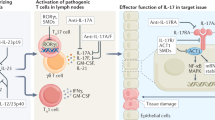Abstract
The immune response triggered following pathogen recognition, though required to clear the infection, can be detrimental if it is produced in excess or fails to resolve promptly. Excessive inflammation contributes to infectious and noninfectious pathologies in the gut (such as inflammatory bowel disease), lung (such as bronchiolitis), and in a variety of autoimmune conditions. T cells contribute significantly to pathology during inflammation. Global anti-inflammatory strategies can alleviate the consequences of exuberant inflammation by suppressing T cell activity, but may leave the patient vulnerable to opportunistic infection. More specific therapies aim to suppress only those T cells involved in the disease process, and one such approach is to target late costimulatory molecules. These are not expressed on naïve or resting memory cells. Rather, they have a specific window of expression and their ligation results in the production of abundant inflammatory cytokines. By targeting these molecules, it is hoped that inflammation will reduce, but that therapies will be specific enough to avoid, global immune suppression. This review focuses on the late costimulatory molecule OX40, compare it with other T cell costimulators, and highlight why it is a more suitable target for immune intervention than other immune suppressive strategies.
Similar content being viewed by others
Abbreviations
- APC:
-
antigen-presenting cell
- IL:
-
interleukin
- ICOS:
-
inducible costimulator
- MHC:
-
major histocompatibility complex
- OX40L:
-
OX40 ligand
- TCR:
-
T cell receptor
- TNF:
-
tumor necrosis factor
- TNFRSF:
-
TNF receptor superfamily
- TNFSF:
-
TNF superfamily
- TRAF:
-
TNF receptor-associated factor
- Treg:
-
regulatory T cells
Author information
Authors and Affiliations
Corresponding author
Additional information
Received: 2008.08.19, Accepted: 2008.09.22
About this article
Cite this article
Cavanagh, M.M., Hussell, T. Is it wise to target the late costimulatory molecule OX40 as a therapeutic target?. Arch. Immunol. Ther. Exp. 56, 291–297 (2008). https://doi.org/10.1007/s00005-008-0032-3
Published:
Issue Date:
DOI: https://doi.org/10.1007/s00005-008-0032-3




